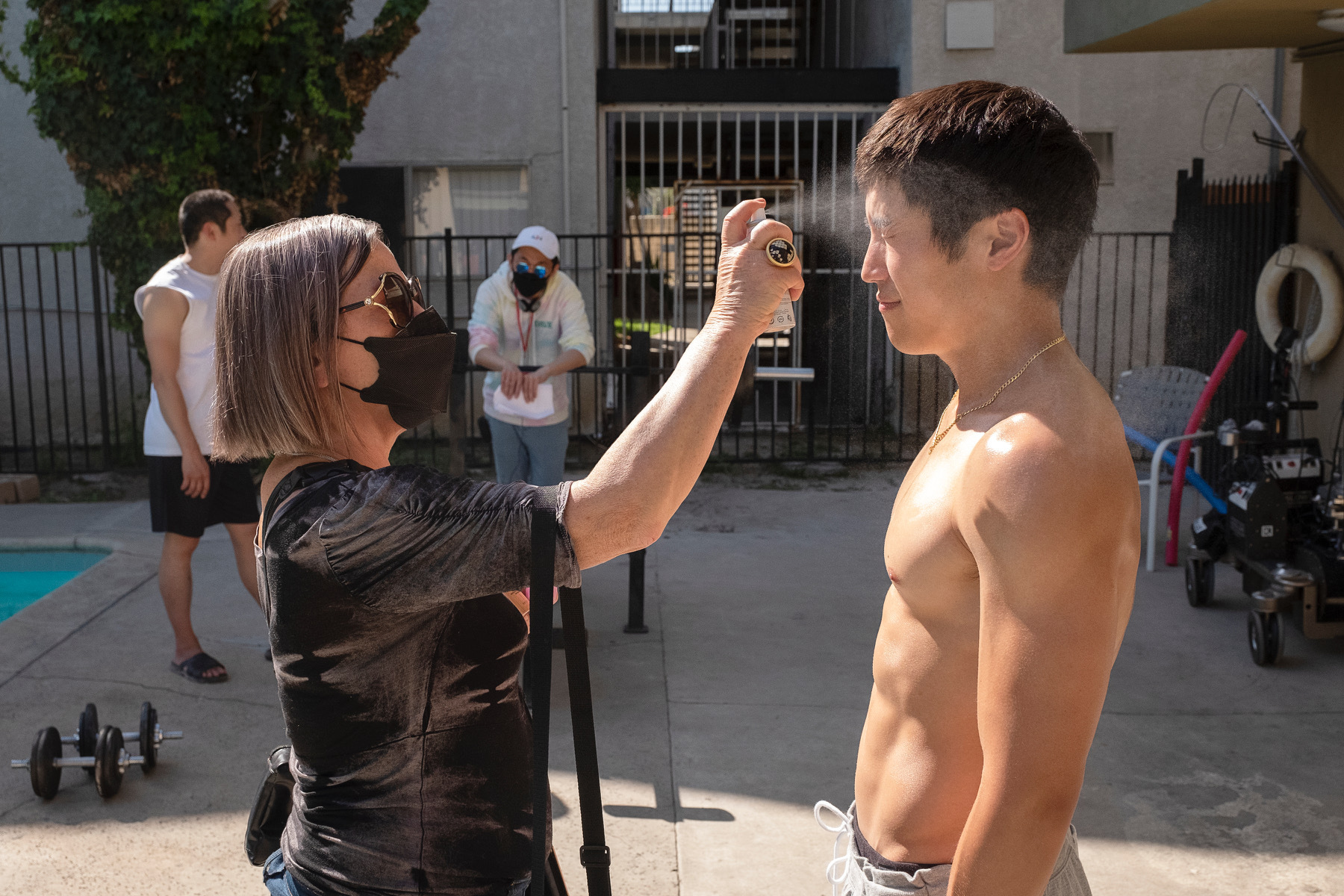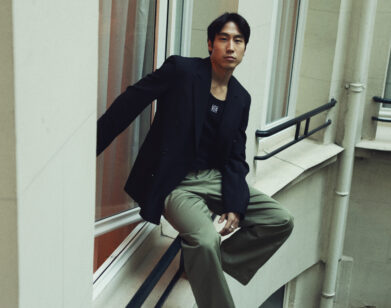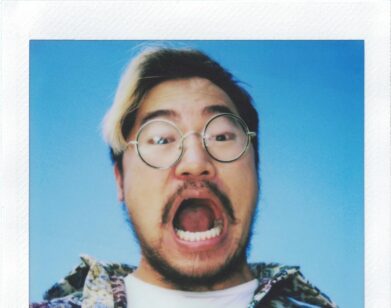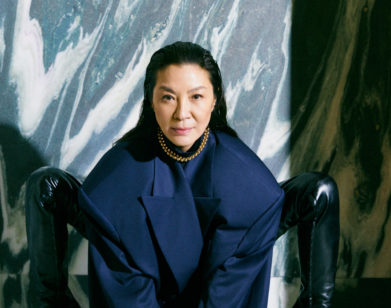in conversation
Young Mazino and Stephanie Hsu Grapple With Life After Making It
If you’re reading this then you’ve probably seen Beef, the savagely funny—and just plain savage—Netflix series about two people (Steven Yeun and Ali Wong) who are involved in a hit-and-run and the collateral damage they leave in the wreckage. You’re also familiar then, with Young Mazino, the 31-year-old actor who plays Paul, the younger brother to Yeun’s character, who, by series end, emerges as the story’s most sympathetic character. But given that Mazino is at a relatively early stage in his career, there’s a lot you don’t know, so we asked the Oscar-nominated actor Stephanie Hsu to find out.
———
STEPHANIE HSU: Oh, my god. Are you glamming while we do this recording?
YOUNG MAZINO: I’m almost done.
HSU: Fame changed Young!
MAZINO: Oh man.
HSU: That is amazing. No, you should do it.
MAZINO: Okay, we’re good.
HSU: Where are you in the world right now?
MAZINO: New York. I’m by Central Park, just doing a quick little brand gig.
HSU: Amazing.
MAZINO: I’ve got to pay the bills.
HSU: Yes, you do.
MAZINO: Where are you at?
HSU: I’m also in New York. I’m in town to be a juror for Tribeca [Film Festival].
MAZINO: Oh, shit.
HSU: I just get an excuse to watch movies, which I’m really excited about because I don’t usually get to watch movies when I go to festivals.
MAZINO: Right.
HSU: Okay, wait, I can’t find my questions, because I have really good ones. So just hold on one second. Sorry.
MAZINO: I can ask you questions, too. There’s so much I’m curious about. How has your life changed since Everything Everywhere [All At Once], and then also, what were you doing before that?
HSU: I was in theater. Wait, hold on, give me two seconds. I lived in New York for 11 years. I sort of started in experimental theater, and then I ended up on Broadway kind of by accident. I was doing the whole New York thing, and then I met the Daniels [Daniel Kwan and Daniel Scheinert] doing an episode of this show called [Awkwafina is] Nora from Queens. Bowen Yang and I did comedy in college together, and this was before Bowen was on SNL. It was an all-Asian comedy show. That’s how we met, and then I basically followed them out to L.A. Within a week and a half they called me, “Hey. No pressure, but we’re working on this movie and we think you’d be really perfect for it.” That’s the backstory. So my life has changed a lot, and also sometimes not a lot, do you know what I mean? I feel like for me, with Everything Everywhere, it was sort of a slow bloom explosion. It feels worth it to mention that I hadn’t even finished watching the whole series yet, I didn’t even get to the thirsty parts, okay? I was genuinely like, “Well, who is that talent?” You literally popped off the screen and your character felt so familiar to me in a way that I had never seen on camera before. Then the next day this interview came in, then I ran into you. So, I’ve been feeling really excited to hear your story. I’m curious, how has your life changed in the last couple of months?
MAZINO: Well, first of all, thank you so much. That was an amazing moment when I ran into you at the gala.I think the doors have swung open from the industry where suddenly, there’s a huge influx of interest from producers, casting directors, and whatnot. I’m in a space where there’s more opportunity. Now I’m faced with the task of figuring out—now that there’s a potential career that’s possible—what I want that to look like. It feels like I have a blank canvas. Besides getting recognized here and there, nothing’s really changed internally. I still feel exactly the same.
HSU: Yeah.
MAZINO: I would say things are more or less the same because I still feel like I need to prove myself. For my next projects, I don’t know where I’m going to be. I wanted to ask you about this, since our projects were so relevant in our particular diaspora. Do you want to continue championing stories within this world that has yet to be fully cultivated and explored, or now that you’re someone noticed by the world, are you trying to jump into cinema that’s already been around for a while? I have this weird thing where I love Western cinema, like Quentin Tarantino, Scorsese, the Cohen Brothers, and Wes Anderson. And then there’s also Bong Joon-ho, Park Chan-wook, and Wong Kar-wai. How do you navigate those different hemispheres of film?
HSU: I think someone asked me this question, “How does it feel to have predominantly worked with all these Asian filmmakers and Asian collaborators? Is that something that’s intentional?” I’ve worked with many non-Asian people before, but when they asked me that question, I sort of realized, “I guess I have been doing a lot of that.” I think honestly, the reason is, especially with the Daniels, when I first read that script I thought to myself like, “This is a character and this is a story that is going to ask me to bring my chops.” Also, I’ve never been offered a role or even invited to audition for a role where I get to be a part of a family. What I’m looking for is collaborators that I admire and love—who I see, who also see me, no matter what their background is. The reality is still, I think, a lot of roles are available and centering on people who are not necessarily white, oftentimes, that initiative comes from people of color. That’s just kind of what’s happening. I’d be really excited if Quentin Tarantino called me up, or you up, and was like, “I want you to be number one, or number one through three, on the call sheet.” I just haven’t gotten that call yet.
MAZINO: I was thinking while we were talking about this, if Spike Jonze was casting for Her now, not to be pessimistic, but I also understand what these waters are. And you’re right, that’s probably not something that would happen naturally. I’m still trying to figure that out. Like, is my ethnic background going to be in the way going forward for other projects? Because I don’t want to be a diversity initiative. I just want juicy projects where-
HSU: Juice.
MAZINO: Like, in what world would Scorsese be like, “This is the guy”? Because I feel like, there has to be some innate understanding of that individual that you’re casting if you’re writing something that’s very personal. I also thin there’s a burgeoning group of young and up-and-coming directors that are colorblind and it’s just really about story and character. And then, we also have AI.
HSU: Yeah, pretty soon it won’t matter because we’ll all be bots. Are you interested in writing or directing or producing?
MAZINO: That’s the end goal, to write and direct. Right now, while I’m young and able, and before my spine is all messed up because I feel like my spinal cord is a metaphor for my life trajectory.
HSU: Is your spine straight right now or are you tipping a little bit?
MAZINO: I think I have some kind of developing scoliosis.
HSU: That’s how I feel.
MAZINO: This gravity and this planet, everything’s against us.
HSU: Well, it’s called crossing the threshold of 30.
MAZINO: I’m slowly feeling the depreciation of my physical assets, which is bittersweet. It’s good, though. That feeling of mortality is useful. Do you have an interest in writing or directing?
HSU: I do. I mean, I never knew I was going to be in this industry, in an actual way, like to pay your bills kind of way. I made home videos with friends, in high school I started the news video broadcast thing with a few friends. Always very ragtag. And then, coming from the world of experimental theater, oftentimes you don’t even have a script, you’re working with a concept.
MAZINO: So do you just improv?
HSU: No, so we would come together in a rehearsal room, and let’s say the concept was dying. Maybe we would do a physical exercise and then maybe we would then write a scene, or we would write a story. Anyway, I came from the background of making stuff. The biggest gift from this past year is that a lot more people are really open to, “What do you want to write, what story do you want to tell?” Are you writing anything now, or are you just taking it all in?
MAZINO: I’m editing a documentary that I shot.
HSU: Oh, amazing.
MAZINO: I do have some scripts. But I hit this—and this tends to happen in writing, where I hit this huge writer’s block. Then I’m like, I haven’t lived long enough to write this.
HSU: I get that.
MAZINO: Sometimes I feel like I need to have more lived experiences and to feel it viscerally, almost like an anthropologist studying people to fully flesh out some kind of concept or a motif. But then again, that might also just be me hindering myself, which is something I tend to do often.
HSU: My friend and I have been developing this show for five years. We finally got producers on it after this past year. I had this moment where—it’s semi-autobiographical, but I realized that we couldn’t write it. We could never crack it because we didn’t have enough perspective. Which I think is similar to what you’re saying about life experience, where, in some way, I hadn’t lived through the trauma yet. I hadn’t moved through enough to be able to understand what I was going through or what we were experiencing. So you’re interested in writing and directing when you shrivel?
MAZINO: Yeah. I think right now, at least for the next couple of years—acting takes such a toll.
HSU: Yeah.
MAZINO: When I shot Beef, I wasn’t sleeping for the four months we were shooting. I would pass out and then wake up and then start the day again. My sleep hygiene was terrible. I don’t know how much time you need to decompress after something like Everything Everywhere, but it took me a few months to just get away from everything and reset.
HSU: What was the hardest thing about filming?
MAZINO: I wanted to leave the project knowing I did everything that I possibly could. Even after the fact, I would second-guess and be like, “Did I do everything I could? Was that as truthful as I could have made it?” Did I avoid embellishing the truth?” Things like that.
HSU: I’m glad you said the thing about how it took you a few months to recoup because I always feel guilty. I’m such a sensitive artist type. I work in a very similar way, when I choose a project or when I feel excited about a role, I don’t know how to not give it my absolute everything. That was a thing that was really hard for me, specifically on Broadway, because you’re doing eight shows a week and press during the day. I’m only now just recovering a little bit from the last year, and it’s been two months. I was reading an interview you did, and I found myself feeling really related to it. “Maybe I’ll just pack up everything and just go get lost.” I’m curious as to what you mean by that. Do you value wandering, or nature? How do you relate to those in relationship to the grind of an industry, or the rocket ship of a career?
MAZINO: Well, I was in New York for seven years going through my own little grind, working, drama school, auditioning. I had a huge chip on my shoulder when I moved because I had something to prove. I dropped out of college, and everyone around me thought I was crazy. For seven years, I never took a second to have any introspection to wonder if I was happy. While I was going through the grind and climbing whatever ladders, my personal life was in flames. The relationships with my parents and my sisters, with my long-distance girlfriend, everything personal was up in flames. And yet, I thought it was the sacrifice to have, in order to climb this thing. When the pandemic hit and threw me for a loop, I was forced to reset and as a result, reevaluate, for the first time in a while, was I happy doing all this stuff? The original joy of working on a film and acting with people who loved the craft, that stuff, it almost became secondary to booking the next big thing.
When I went back home I found myself trying to mend my relationship with my family. I was like, “What do you guys need me to do?” And they’re like, “We need you to chop wood.” So I’m in the backyard, just chopping wood for several hours a day. It broke things down to something so simple. Suddenly, these arbitrary dreams of becoming an actor, Hollywood, and joining this huge industry and machine, all became almost fugazi to me. In some ways, it was alchemy, after all that transpired, that’s when Beef came around. I was on the verge of walking away. My desires and ambitions changed. It was focusing less on ascending to some lofty height that I knew nothing about, and instead focused on knowing what I know, which is essential, to quote the great Kendrick [Lamar], “Smoke good, eat good, live good.” Now I realize, with life being so ephemeral and fleeting, that’s all I can really hope for, which is to enjoy the things that come my way daily. I think that’s where the artist is. As I’m going through these changes these last few months, which have been a whirlwind of things I haven’t experienced before, can I maintain myself? If I can’t, and if I find myself losing touch back into that state of mind where I was in New York, I can pull the plug. When you’re telling me about experimental theater, that got me more excited than some of these scripts that are coming my way, some of these direct offers.
HSU: Oh, I relate.
MAZINO: I want to hold on to whatever that childlike sense of enjoyment was in life, no matter how small that scope gets.
HSU: It’s hard. Do you feel like you have found a sweet spot where you are at right now?
MAZINO: No.
HSU: That is also a relief to hear!
MAZINO: Things feel quite unhinged right now because on one hand people are saying the world is your oyster and whatnot. But then I’m an existentialist by nature, borderline nihilist, and I fight with that every day. In that sense, it helps me stay grounded.
HSU: Wow. I’m almost getting a wave of emotion, just hearing you say that, because to be honest, I haven’t had a lot of conversations [about this]. After the movie came out, people were really excited, but it really wasn’t until award season that it really became apparent. Our movie just kept growing and growing and growing. I felt so many layers of that world open. I found myself feeling so overwhelmed. I had no idea who was going to be in the movie, I had no idea if it was just going to be a video for Vimeo or an under $1 million independent project. I knew nothing about the world of film. I couldn’t have possibly imagined this outcome. Everything I’ve ever done, I’ve followed simply from the very sweet seed of artistic sprout. Suddenly when the world was my oyster, I was getting so many scripts from people I have never heard of, or even people who are really well known. It was such a flood that I found myself being like, “What do I, Stephanie, actually want?” I’ve never cared about success in the traditional sense. Suddenly, I had so many people who saw this possibility for me that it was hard to hear myself. And what an obviously amazing problem to have, I guess?
MAZINO: Now that you’ve done a huge film, do you have a preference for film versus theater?
HSU: I have really fallen in love with movie-making. The thing that I’m developing is a TV show, but I love movies. It feels like you all know what you’re building towards, everyone’s holding on to the same thread. I love co-creating in that way. How about yourself?
MAZINO: I definitely feel the same way. I want to preserve that 90-minute movie format for as long as possible, despite all these other formats that are coming out. Beef was 10 episodes, 30 minutes, so essentially a five-hour movie. I think there’s something nice in 90 minutes, where it’s a contained story. I’m still figuring that out. I miss theater in the sense that once you go, you go until the play ends. Regardless of whatever happens, you just deal with it on the spot.
HSU: I think one day I would go back. I wanted to also mention, other than the fact that I think you’re a really wonderful actor, you’re so good at basketball. You’re legitimately good. Some of those shots, I was like, “Oh, he actually made those shots.”
MAZINO: Um, movie magic.
HSU: Are you not good at basketball?
MAZINO: I can play.
HSU: I bet you’re pretty good.
MAZINO: I’m going to the Simu Liu, Jeremy Lin charity classic game in Toronto in July, so hopefully I’ll score some buckets then.
HSU: That’s amazing.
MAZINO: No promises.
HSU: In this moment where the world is your oyster, what is your compass, and is there a genre or type of work that you feel really excited about doing?
MAZINO: That’s a good question. First and foremost, it comes down to the writing and the director. Outside of that, I would love for a character that specializes in a certain field. If he was an aspiring basketball player, I would love the chance to train, like, hardcore, eight hours a day for six months on the court. Or drive a taxi for six months. I think that’s a great way to prep for a character. I’m quite genre-agnostic. One thing I would steer clear of is I don’t want to be in a high school YA series.
HSU: That’s what I say all the time. Even though Asian don’t raisin, I’m like, “I am not 17.”
MAZINO: I do want to do things that are romantic, dramatic, or comedic, but it needs to be grounded in really strong writing. I love Charlie Kaufman as a writer just as much as I love the work that Yorgos Lanthimos will do, or Nicolas Winding Refn. Things that can be a little more surreal and a little more gritty. But then, I would love to do something more action-oriented, granted that they don’t write a script around violence for the sake of violence. Are you genre-specific?
HSU: I’m not. I feel passionately about the why. For me, in a world that feels like it’s deteriorating at a constant rate, and when there’s so much content, I like knowing why a story is being made. I want to be able to stand behind something fully, throughout its birthing. Art saves me daily and has given me such a beautiful life. I feel hugely invested in it.
MAZINO: You just reminded me, I was reading this book on Werner Herzog and what he’s searching for when he makes his documentaries. I think this translates into our work too, into the world of narrative filmmaking. He doesn’t want to do conventional storytelling, but he’s looking for the ecstasy of truth. That’s something I aspire to find as well. It doesn’t matter what project or what medium or format, just finding the ecstasy of truth. I think that’s the only reason why I’m here.
HSU: I love that. Well, you have to go be fancy now. I have to go be fancy too, let’s be honest. I have one last question. Is there anything you feel you want to share that you haven’t been able to communicate in previous interviews?
MAZINO: Well, the impulsive thought that came to mind is I’m only human. I need to tell myself that more and relieve that burden of expectation on myself. Is there anything you would like to impart?
HSU: I asked the question. That’s a hard question. I think I have two parts. In a career sense, there will be inevitable things that I will do that maybe won’t be as mind-blowing as Everything Everywhere. Also, for people who really admire me, just to say that I get to do all of these really extravagant things, but I also am just human. That type of ecstasy or magnificence is available to all of us in some way
MAZINO: I love that.






